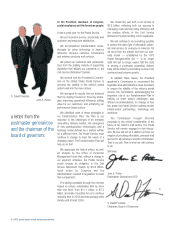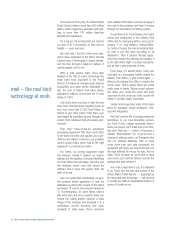US Postal Service 2003 Annual Report Download - page 14
Download and view the complete annual report
Please find page 14 of the 2003 US Postal Service annual report below. You can navigate through the pages in the report by either clicking on the pages listed below, or by using the keyword search tool below to find specific information within the annual report.12 | 2003 annual report united states postal service
2003
legislation:
important public
policy decisions for
America’s postal
system.
In the drastically changed security environ-
ment growing from the terrorist attacks of
2001, aviation security has been an issue
high on Congress’ agenda. Several bills,
including H.R. 2144, the Aviation Security
Technical Corrections and Improvements Act
of 2003, were introduced in both the Senate
and the House of Representatives that called
for screening of aircraft cargo. Most bills
included mail within the definition of cargo. S.
824, passed by the Senate, would require the
Department of Homeland Security to study air
cargo security.
H.R. 2555, introduced in the House of
Representatives, contained an amendment
that would not have permitted the transport of
unscreened cargo, including mail, on passen-
ger planes. While this bill was enacted and
became Public Law 108-90, this amendment
was stricken and funds were appropriated for
research on this issue.
Legislation was introduced to encourage
employers to make up the difference between
the civilian and military compensation of
employees who are called to duty as reservists
or as members of the National Guard.
These include S. 442, S. 593, H.R. 217 and
H.R. 1345.
The issue of postal reform remained
prominent with the introduction of S. 1285,
the Postal Accountability and Enhancement
Act of 2003, building on the postal reform
legislation introduced by the House of
Representatives in the last Congress. The bill
would preserve universal service and the
Postal Service’s exclusive access to the
mailbox. It also would create a Postal
Regulatory Commission which would develop
a new pricing system for postal market-domi-
nant products. A number of the bill’s
provisions were reflected in the recommenda-
tions of the President’s Commission on the
United States Postal Service.
Two bills affecting postmasters’ compen-
sation and benefits, S. 678, the Postmaster
Equity Act of 2003, and H.R. 2249, the simi-
larly-named Postmasters Equity Act of 2003,
were enacted as Public Law 108-86. The law
amends Title 39, U.S. Code, to permit post-
masters and postmasters’ organizations to
have access to fact-finding in compensation
discussions. It also gives postmasters the
right to convene nonbinding fact-finding to
resolve differences between their representa-
tives and Postal Service management.
Perhaps the most significant postal legis-
lation enacted was Public Law 108-18, the
Postal Civil Service Retirement System
Funding Reform Act of 2003. The law helps
the Postal Service to avoid an overpayment of
$105 billion to the Civil Service Retirement
System. An analysis by the Office of Personnel
Management found that the net accumulated
value of our payments to the Treasury
approached the value of future CSRS benefits
attributed to our participants. The potential
overfunding was due to the excess interest
earned by the fund. With the savings from the
change in the funding schedule, the Postal
Service is reducing debt and holding postage
rates steady until 2006.
H.R. 2673, the Omnibus Appropriations
Act for 2004, would extend the sales period
for the Breast Cancer Research Semipostal
stamp, first issued in 1998, and due to expire
at the end of calendar year 2003, for an addi-
tional two years. The Conference Report is
pending before the House and Senate for a
final vote.
The Postal Service testified at a number of
oversight and other hearings in both the Senate
and House of Representatives. This included
the Postmaster General’s appearance before
the Senate Governmental Affairs Committee to
testify regarding the recommendations of the
President’s Commission on the United States
Postal Service.
Subjects of other hearings included the
reclamation of Washington, DC’s Curseen-
Morris Processing and Distribution Center,
the effects of the 2001 anthrax mailings
on the Wallingford, CT Processing and
Distribution Center, the screening for radioac-
tive materials in incoming international mail
and the Uniformed Services Employment and
Reemployment and Rights Act.
























